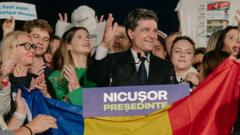In a high-stakes election filled with political tension, Nicusor Dan, the liberal mayor of Bucharest, emerged victorious with 53.6% of the vote against nationalist candidate George Simion. The election followed a turbulent period marked by the annulment of a previous race due to alleged Russian interference. Dan's victory is seen as a response to the desire of many Romanians for stability and a progress-oriented approach, contrasting sharply with Simion's far-right nationalist agenda.
Voter turnout reached about 11.5 million on election day, with Dan securing support from more than six million voters. Celebrations erupted outside Bucharest’s City Hall as Dan patiently awaited results past midnight. After confirming his win, he emphasized the need for unity among Romanians, regardless of political stance, declaring that his election would lead to meaningful change.
Support for Dan was robust, both domestically and among the Romanian diaspora, who demonstrated a preference for pro-European governance. Conversely, Simion found much of his support in earlier voting rounds among overseas Romanians in Western Europe, where he performed well in countries like Spain and Germany.
As the election unfolded, many Romanians expressed concerns about Simion’s far-right affiliation. Dan campaigned on promises of anti-corruption measures and consistent support for Ukraine, while Simion challenged EU relations, claiming his popularity stemmed from a nationalist sentiment among disillusioned voters.
Despite his defeat, Simion held on to a significant portion of the vote, reflecting a rising nationalist discourse in Romanian politics. However, the election ultimately signaled a strong rejection of isolationist policies and a continued commitment to European integration.
Following the election, leaders from neighboring Moldova and Ukraine congratulated Dan, reaffirming collaborative ties centered on democratic values and regional stability. European Commission President Ursula von der Leyen praised the high voter turnout as an endorsement of an open and prosperous Romania.
While the polarization in Romanian politics remains pronounced, the electoral outcome indicates a preference for liberal governance over nationalist ideologies, suggesting a pivotal moment in the country’s democratic journey.
Voter turnout reached about 11.5 million on election day, with Dan securing support from more than six million voters. Celebrations erupted outside Bucharest’s City Hall as Dan patiently awaited results past midnight. After confirming his win, he emphasized the need for unity among Romanians, regardless of political stance, declaring that his election would lead to meaningful change.
Support for Dan was robust, both domestically and among the Romanian diaspora, who demonstrated a preference for pro-European governance. Conversely, Simion found much of his support in earlier voting rounds among overseas Romanians in Western Europe, where he performed well in countries like Spain and Germany.
As the election unfolded, many Romanians expressed concerns about Simion’s far-right affiliation. Dan campaigned on promises of anti-corruption measures and consistent support for Ukraine, while Simion challenged EU relations, claiming his popularity stemmed from a nationalist sentiment among disillusioned voters.
Despite his defeat, Simion held on to a significant portion of the vote, reflecting a rising nationalist discourse in Romanian politics. However, the election ultimately signaled a strong rejection of isolationist policies and a continued commitment to European integration.
Following the election, leaders from neighboring Moldova and Ukraine congratulated Dan, reaffirming collaborative ties centered on democratic values and regional stability. European Commission President Ursula von der Leyen praised the high voter turnout as an endorsement of an open and prosperous Romania.
While the polarization in Romanian politics remains pronounced, the electoral outcome indicates a preference for liberal governance over nationalist ideologies, suggesting a pivotal moment in the country’s democratic journey.



















